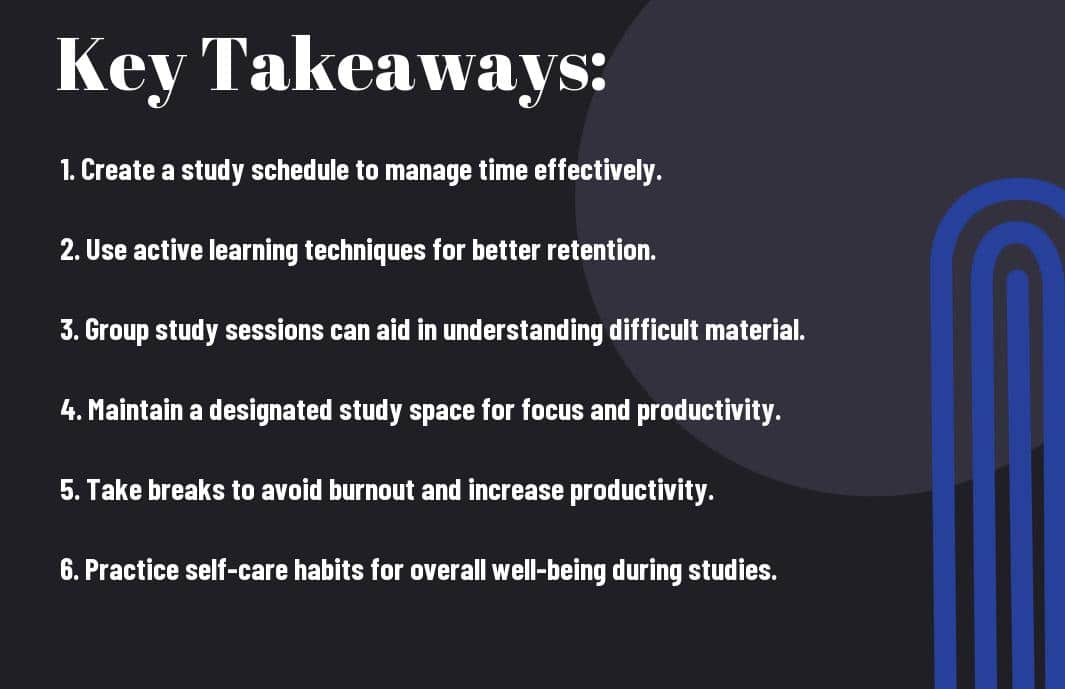Efficiently conquer your university studies with these imperative study hacks that will revolutionize the way you learn. From time management strategies to memory retention techniques, these tips are crucial for every university student looking to succeed academically. Get ready to level up your study game with these powerful hacks!
Key Takeaways:
- Stay organized: Use tools like planners, calendars, and phone apps to keep track of assignments, exams, and deadlines.
- Time management is key: Prioritize tasks, create a study schedule, and take regular breaks to avoid burnout and stay focused.
- Stay healthy: Get enough sleep, eat well, and exercise regularly to maintain your physical and mental well-being for optimal academic performance.

Plan Your Schedule
Use a planner
Ahh, the trusty planner – a student’s best friend! You’ll want to have all your assignments, deadlines, and important dates in one central location. By writing everything down, you free up valuable brain space for actually studying and enjoying your college experience. Take it old school with a physical planner or go digital with apps like Google Calendar or Trello.
Set goals
If you don’t know where you’re headed, any road will take you there. Set clear and achievable goals for each semester, month, week, and day. Know what you want to accomplish and break it down into manageable chunks. Whether it’s acing a particular exam, improving a skill, or joining a club, having a roadmap will keep you focused and motivated throughout your university journey.
Plus, setting goals gives you a sense of purpose and direction. It helps you prioritize your tasks, stay organized, and measure your progress. Make sure your goals are specific, measurable, and time-bound. And don’t forget to celebrate your wins along the way!
Create a Study Environment
Minimize distractions
Any successful study session begins with creating a distraction-free environment. Turn off notifications on your phone, use website blockers to prevent access to social media, and find a quiet space where you can focus solely on your work. Note, every distraction can take away precious minutes from your study time. Stay hyper-focused and watch your productivity soar!
Organize space
Some students thrive in a tidy, organized workspace. Invest in desk organizers, storage solutions, and utilize color-coding techniques to keep your study area clutter-free. Create a workspace where you can easily locate your materials and stay on track with your study schedule.
To take your organization game to the next level, consider setting up designated zones for different subjects or tasks. Streamline your study process by having a clear space for each aspect of your academic life.

Develop a Note-Taking System
Choose a method
Some students swear by traditional handwritten notes, while others prefer typing on a laptop or tablet. Find what works best for you. Experiment with different methods until you discover the one that helps you retain information most effectively. Whether it’s bullet points, mind maps, or Cornell notes, make sure your system is organized and easy to follow.
Review regularly
Regularly reviewing your notes is crucial for retaining information long-term. Set aside time each week to go over your notes from all your classes. Create flashcards, quiz yourself, or teach the material to a friend. This active review process will reinforce your learning and help you ace those exams.
This practice strengthens your memory and helps you identify any gaps in your understanding. By regularly reviewing your notes, you stay on top of your coursework and avoid cramming before exams. Make it a habit to revisit your notes soon after class and then periodically throughout the semester.
Utilize Study Groups
Share insights
Now, one of the most effective ways to learn is to teach. In a study group, you have the opportunity to share your insights and knowledge with others. By explaining concepts to your peers, you reinforce your understanding and retention of the material. Plus, you might gain new perspectives from your group members that you wouldn’t have considered on your own. Collaboration is key!
Solve problems together
Now, when you come across a challenging problem or question, don’t struggle alone. Any complex topic can become clearer when discussed in a group setting. By pooling your collective brainpower, you can tackle difficult problems more efficiently and effectively. Sharing different problem-solving strategies can lead to a deeper understanding of the subject matter.
The collaborative nature of study groups allows you to benefit from the diversity of perspectives and skills within the group. You can leverage this network to fill in the gaps in your knowledge and improve your problem-solving abilities. Don’t underestimate the power of teamwork when it comes to mastering your coursework.
Practice Time Management
Prioritize tasks
While juggling various assignments and social commitments, it is crucial to prioritize your tasks effectively. Start by creating a to-do list at the beginning of each day, ranking tasks in order of importance. Focus on completing the most urgent and challenging assignments first to avoid last-minute stress. By prioritizing tasks, you can ensure that you make efficient use of your time and stay on track with your academic responsibilities.
Avoid multitasking
While multitasking may seem like a time-saving strategy, it can actually decrease productivity and hinder your ability to focus. Studies have shown that switching between tasks can lead to a decline in overall performance and a decrease in the quality of work produced. Instead of trying to do multiple things at once, focus on one task at a time to maximize efficiency and maintain a higher level of concentration.
With that being said, it is important to remember that our brains are not designed to handle multiple tasks simultaneously. By focusing on one task at a time, you can give it your full attention and produce higher quality results. This approach not only improves productivity but also reduces the likelihood of errors and allows for a more thorough understanding of the material being studied.
Practice setting aside dedicated time blocks for specific tasks, allowing yourself to fully immerse in the work at hand. By eliminating distractions and committing to single-tasking, you can improve your time management skills and ultimately achieve better academic success.
Stay Healthy
Regular exercise
Not exercising regularly can negatively impact your overall well-being and cognitive function. For university students, incorporating exercise into your routine is crucial for managing stress and staying focused. Whether it’s hitting the gym, going for a run, or practicing yoga, make sure to prioritize physical activity to optimize your study sessions.
Balanced diet
Clearly, maintaining a balanced diet is vital for fueling your body and brain. It’s easy to resort to unhealthy fast food options when you’re busy with assignments and exams, but consuming nutritious foods is key to sustaining high energy levels and mental clarity. Make sure to include a variety of fruits, vegetables, whole grains, lean proteins, and healthy fats in your meals to support your academic performance.
It’s important to avoid excessive consumption of sugary snacks and caffeine, as they can lead to energy crashes and decrease your productivity. Instead, opt for nutrient-dense foods that will keep your energy levels stable throughout the day. By prioritizing a balanced diet, you’ll not only feel better physically but also mentally, allowing you to tackle your studies with vigor and focus.
Take Regular Breaks
Short breaks
Breaks are imperative for productivity and learning. Your brain can only focus for a limited amount of time before it starts to lose steam. Schedule short breaks every 25-30 minutes of study time. During these breaks, get up, stretch, walk around, or do some deep breathing exercises. This will help you stay energized and focused when you return to your study session.
Longer intervals
Intervals of longer breaks are just as important as short breaks. It’s recommended to take a longer break of 15-30 minutes after every 2 hours of focused study. Use this time to rest your brain, go for a walk, grab a healthy snack, or do something you enjoy. Rest is key to retaining information and preventing burnout.
It’s important to remember that longer intervals are not for procrastination or mindless scrolling on social media. Instead, use this time wisely to recharge and refocus your mind for the next study session. By incorporating regular breaks into your study routine, you’ll find yourself more productive and efficient in your learning process.
Use Active Learning Techniques
Teach others
Keep your learning active by teaching others. When you explain a concept to someone else, you reinforce your own understanding. This not only helps you remember the information better but also improves your communication skills. Teaching others can be done through study groups, tutoring sessions, or even creating content on social media platforms. Embrace the opportunity to share your knowledge and watch how it deepens your own learning experience.
Self-quizzing
One powerful active learning technique is self-quizzing. Instead of passively reviewing notes, actively test yourself on the material. Create flashcards, take practice quizzes, or summarize key points from memory. Self-quizzing not only helps you assess your understanding but also enhances your long-term retention of the information. Challenge yourself regularly to recall facts and concepts without looking at your notes to truly internalize the material.
Leverage Educational Technology
Study apps
Many university students can benefit from using study apps to enhance their learning experience. Whether you need help with organization, time management, note-taking, or studying for exams, there’s an app for that. Apps like Anki, Quizlet, and Forest are designed to help you stay on top of your academic game and boost your productivity.
Online resources
You’ll find a treasure trove of online resources that can support your studies. From virtual libraries and academic journals to online tutoring services and educational YouTube channels, the internet offers a wealth of information at your fingertips. Take advantage of platforms like Khan Academy, Coursera, and Google Scholar to access reliable sources and expand your knowledge beyond the classroom.
It’s important to remember that not all online resources are created equal. Be wary of misleading information and always fact-check your sources to ensure accuracy and reliability. Look for credible sources backed by experts in the field to enhance your learning experience and avoid falling prey to misinformation.
Review Material Before Sleep
Nightly revision
Clearly, one of the most effective study hacks every university student should know is the power of nightly revision. Right before you hit the hay, take a few minutes to review the key points from your study sessions earlier in the day. This not only helps reinforce the information in your mind but also primes your brain to work on it while you sleep.
Sleep consolidation
If you want to truly optimize your learning and retention, focusing on sleep consolidation is key. This concept refers to the process of strengthening memories during sleep, particularly during the REM stage. During this phase, your brain replays and consolidates information, making it easier to remember in the future.
If you make a habit of reviewing material before sleep, you can dramatically improve your retention and understanding of the subject matter. This simple yet powerful hack leverages your brain’s ability to process and store information during rest, giving you an edge in your academic pursuits. So, before you doze off, take a few moments to go over your notes or flashcards – your future self will thank you for it!
Conclusively
By implementing these 10 imperative study hacks, you’ll be setting yourself up for success in your university journey. Bear in mind, consistency is key, so find what works best for you and make it a habit. Stay focused, stay disciplined, and most importantly, stay hungry for knowledge. The world is yours for the taking, so go out there and crush it! Your future self will thank you for putting in the effort now. Now go out there and show the world what you’re made of!
FAQ
Q: Why are study hacks important for university students?
A: Study hacks are important for university students because they help improve productivity, efficiency, and overall academic success. By utilizing these hacks, students can better manage their time, retain information, and reduce stress.
Q: What is the Pomodoro Technique and how can it help with studying?
A: The Pomodoro Technique is a time management method where you work for 25 minutes, then take a 5-minute break. This technique helps improve focus and concentration while studying by breaking up study sessions into manageable intervals.
Q: How can organization improve study habits?
A: Being organized can significantly improve study habits by helping students keep track of deadlines, assignments, and study materials. Organization reduces stress and allows for better time management.
Q: What role does a study schedule play in academic success?
A: A study schedule is important for academic success because it provides structure and consistency to study routines. By creating a schedule, students can allocate time for different subjects and ensure they cover all necessary material.
Q: How can students effectively take notes during lectures?
A: Students can effectively take notes during lectures by using abbreviations, symbols, and bullet points to capture key points. It’s also important to actively listen, ask questions, and review notes regularly to reinforce learning.
Q: What are some tips for staying motivated while studying?
A: To stay motivated while studying, set specific goals, reward yourself for accomplishments, and surround yourself with a positive study environment. It’s also helpful to take breaks, exercise, and visualize success to boost motivation.
Q: How can students improve their memory retention for exams?
A: Students can improve memory retention for exams by utilizing mnemonic devices, practicing retrieval techniques, and teaching concepts to others. Additionally, getting enough sleep, eating well, and staying hydrated are important factors for optimal brain function.





